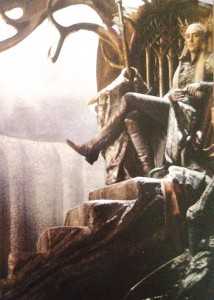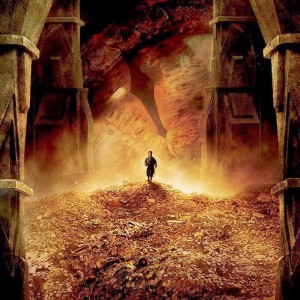Wisdom
 Thranduil’s experience of the Last Alliance was deeply affecting. But not, I think, in the sense that it filled him with the horror of battle, and the desire to avoid it at all costs.
Thranduil’s experience of the Last Alliance was deeply affecting. But not, I think, in the sense that it filled him with the horror of battle, and the desire to avoid it at all costs.
But there was in Thranduil’s heart a still deeper shadow. He had seen the horror of Mordor and could not forget it. If ever he looked south its memory dimmed the light of the Sun, and though he knew that it was now broken and deserted and under the vigilance of the Kings of Men, fear spoke in his heart that it was not conquered for ever: it would arise again.
Unfinished Tales, The Sindarin Princes of the Silvan Elves.
Thranduil’s great fear is not battle or war in itself, it is the re-emergence of Sauron and the ravishment of Middle-earth which his dominion would bring. I guess that it is this great fear that prompts him to work in the ways that he can to assist the other Free Peoples of Middle-earth. I suspect this is why he aids Gandalf with the matter of Gollum, and why he sends Legolas (not some leser envoy) to Rivendell.
Self-discipline
 Thranduil is certainly not without flaw. In The Hobbit, he certainly has a weakness. A love of, and desire for, treasure.
Thranduil is certainly not without flaw. In The Hobbit, he certainly has a weakness. A love of, and desire for, treasure.
If the elf-king had a weakness it was for treasure, especially for silver and white gems; and though his hoard was rich, he was ever eager for more, since he had not yet as great a treasure as other elf-lords of old.
Greed (coupled with overweening arrogance) in the form of his lust for the Silmaril plays a major role in the demise of Elu Thingol at the hands of the dwarves of Nogrod. For Thingol, the Silmaril becomes all-consuming and he cannot set thought of it aside. Yes, as told in the Quenta Silmarillion, the dwarves who labour for Thingol to re-set Feanor’s jewel within the Nauglamir become determined to cheat him (there is no indication Thingol intended to cheat them of payment), but the King of Doriath loses his rationality, and thus his life.
Thranduil immediately realises the import of the death of Smaug: a vast treasure hoard is there for the taking. Yet Thranduil is not single-minded that he fails to pause to assist the folk of Lake-town. His help saves many of the Lake-folk from death due to exposure.
But the king, when he received the prayers of Bard, had pity, for he was the lord of a good and kindly people; so turning his march, which had at first been direct towards the Mountain, he hastened now down the river to the Long Lake. He had not boats or rafts enough for his host, and they were forced to go the slower way by foot; but great store of goods he sent ahead by water.
The Hobbit, Fire and Water.
More, Thranduil gives way to Bard’s claim when it emerges that Thorin has survived. And he proves a cooler head than Bard when the dwarves of Dain approach the mountain and demand passage. He is not so in love with the idea of treasure that he is willing to rashly throw lives away in its cause.
But the Elvenking said: “Long will I tarry, ere I begin this war for gold. The dwarves cannot press us, unless we will, or do anything that we cannot mark. Let us hope still for something that will bring reconciliation. Our advantage in numbers will be enough, if in the end it must come to unhappy blows.”
The Hobbit, The Clouds Burst.
Smart, successful, disciplined and able to see the bigger picture. That’s Thranduil in a nutshell. Under-estimate at your peril.


